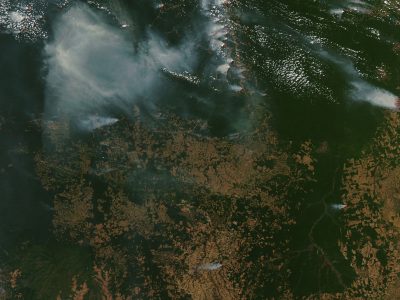The Amazon Fires and the Dawn of Environmental Interventions

So-called “environmental interventions” might become commonplace as global powers seek excuses to intervene in the domestic affairs of sovereign states in order to seize control of their natural resources.
The entire world has watched in horror over the past week as the Amazon rainforest burns worse than it’s ever done before, or at least that’s the narrative that the Mainstream Media wants the global audience to believe. The storyline is that ranchers have been emboldened by Brazilian President Bolsonaro’s rhetoric about developing the rainforest region and therefore decided to set more fires than ever in order to clear as much land as possible for future cattle ranching and settlement. It’s true that the country’s leader might have inspired some rogue ranchers, who he belatedly decided to blame after first suggesting that left-wing environmental groups were responsible, but that doesn’t explain the media firestorm that’s since commenced and the manipulation of international perceptions in favor of what can only be described as an “environmental intervention” by a select group of global powers.
It’s factually false to assert that these latest fires are unprecedented, as proven by the investigative reporting that Off Guardia’s Catte Black carried out, and Bolsonaro already called out French President Macron for jumping on the bandwagon and misleadingly sharing older photos purporting to be of the most recent fires just like a host of celebrities have done as well. The French leader has taken the lead in trying to assemble international support for putting out this blaze, though he and the rest of his ilk are silent about the much worse fires presently raging all across the Southern African country of Angola right now, strongly suggesting that there are ulterior motives behind their laser-focused interest in the resource-rich Amazon. Macron has already politically instrumentalized the crisis to blackmail Brazil by threatening to block a long-negotiated EU-Mercosur trade deal because of it, showing that he’s not afraid to exploit these fires for his own purposes.
Unwittingly, the possible collapse of EU-Mercosur trade talks would only help the US since it would make it much easier for Trump to clinch a similar pact with the bloc as part of his “Fortress America” vision of reestablishing the US’ hemispheric hegemony if it’s not institutionally tied to the EU. Macron’s EU allies must be aware of this possibility, which might be why Merkel commented that she didn’t think that this move would be an “appropriate response” to what’s happening, further exacerbating ongoing Franco-German divisions driven by the competition between those two countries for leadership of the EU. In any case, it’s clear that foreign powers are trying to take advantage of this crisis to increase their influence over the Amazon basin on the pretext that its forestry resources are much too important to mankind to be allowed to burn uncontrollably. That “publicly plausible” mission statement, for lack of a better word, is a dangerous precedent.
Russia’s vast Siberian region has recently struggled with large-scale fires as well, though mostly thought to be naturally occurring and not the result of rogue ranchers, and could one day become the target of similar “environmental interventions” by the G7 countries (even in the event that Russia returns to the organization). There’s no denying that the Amazonian rainforests and Siberian taiga greatly contribute to producing significant amounts of the world’s oxygen and reducing some of its carbon dioxide, but the question arises of how far other countries should go to ensure that these resources aren’t “naturally” destroyed. Furthermore, it’s fair to ask whether their “environmental interventions” are sincere or driven by ulterior motives, whether political (like with Macron and his Mercosur trade deal statement) or strategic (such as capturing control of these resources). Brazil and Russia are incomparable in terms of their national strength, but it’s possible that the former might be a test case for perfecting “environmental intervention” plots against the latter one day.
As it stands, there isn’t any credible chance that a large-scale “environmental intervention” on par with the “humanitarian interventions” before it is in the cards, but the possibility nevertheless exists for further foreign meddling in Brazil’s sovereign affairs on the pretext that the national government can’t ensure the safety of its globally significant forestry resources. This train of thought mirrors the exact same one utilized by proponents of “humanitarian interventions” whenever they purport that the targeted national government can’t ensure the safety of its civilians so the world therefore has a “Responsibility to Protect” them by whichever means necessary. The dawn of “environmental interventions” is therefore approaching, and they’ll probably be much more commonplace in the coming future as global powers compete for access to dwindling forestry and hydrological resources (both rivers and aquifers) and use whatever excuse they can come up with to rally support for their Machiavellian moves.
*
Note to readers: please click the share buttons above or below. Forward this article to your email lists. Crosspost on your blog site, internet forums. etc.
This article was originally published on OneWorld.
Andrew Korybko is an American Moscow-based political analyst specializing in the relationship between the US strategy in Afro-Eurasia, China’s One Belt One Road global vision of New Silk Road connectivity, and Hybrid Warfare. He is a frequent contributor to Global Research.

